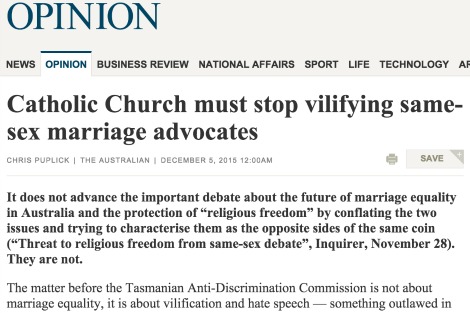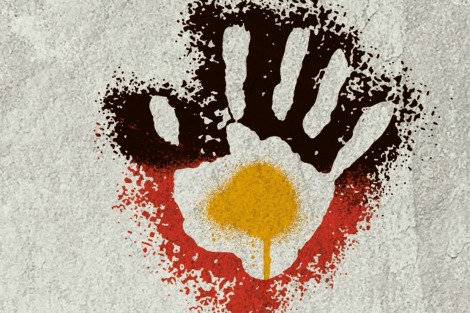Keywords: Religious Discrimination Bill
-

RELIGION
- Frank Brennan
- 11 December 2015
39 Comments
Chris Puplick, a former senator and former president of the NSW Anti-Discrimination Board, is one of a rising chorus expressing strong objections to the Australian Catholic bishops daring to evangelise and speak publicly about their views on same sex marriage. I too would be very upset if my bishops were saying, as Puplick claimed in an opinion piece in The Australian, that homosexuals are 'seriously depraved, intrinsically disordered, less than whole and messing with kids'. But they're not.
READ MORE 
-

AUSTRALIA
- Frank Brennan
- 10 December 2015
I first met this Tony on my regular visits here to Darwin when he was working at the North Australian Aboriginal Legal Aid Service and then when he set up the mediation services under the auspices of Anglicare. In later years I knew him when he was your Anti-Discrimination Commissioner. He was a quiet, considered, gentle, strong and principled man. On Human Rights Day, it is only fitting that I honour Tony by offering some reflections on the architecture for human rights in Australia, on the contemporary human rights controversies, and on the way forward for better protection of the human rights of Aborigines and asylum seekers, two marginalised groups who had a special claim on Tony's sympathies.
READ MORE
-

RELIGION
- Frank Brennan
- 04 December 2015
1 Comment
'Tonight, gathered here in the Southern Cross Club in the national capital, gathered as Eureka's children. We affirm that there is room for everyone under the Southern Cross. I hope you will return to Canberra carrying the Southern Cross flag when we proclaim the Australia Republic on 1 January 2020 which will be two elections after Australia last had a monarchist leader of a major political party. Tony Abbott is the last of his type. Whether the prime minister honoured to witness the proclamation is Malcolm Turnbull, Bill Shorten or another matters not.' Annual Dinner for Eureka's Children, Southern Cross Club, Canberra, 3 December 2015.
READ MORE
-

RELIGION
- Frank Brennan
- 03 December 2015
The consideration of medico-legal problems in the public square of a pluralistic democratic society keeping pace with profound technological change is often marked by simplistic assertions, precluding considerations of comprehensive world views, whether religious or philosophical. It is now commonplace for doctors to be told to leave their consciences at the door, as their patients are consumers and they are suppliers and of course the market decides. Debates about law and policy are often resolved with simplistic assertions about individual rights and autonomy, with little consideration for the public interest, the common good, and the doctor-patient relationship. Even conscience is said to be a matter for contracting out. This evening I ask whether there are more compelling ways to resolve medico-legal dilemmas, while conceding a limited role for law in determining the range of acceptable answers.
READ MORE
-

RELIGION
- Frank Brennan
- 27 November 2015
2 Comments
'The crisis of child sexual abuse in our societies has required that our institutional procedures be more transparent and that we learn from the ways of the world in exercising power openly and justly. This means we have to restructure some of our church arrangements so that power is exercised accountably and transparently. All of us who have positions of influence and power in institutional churches need to be attentive to the voices of those who have suffered within our institutions.' 'Discerning the place for the prophetic voice and pragmatic cooperation of the churches in the great moral questions of the age', address to the Association of Practical Theology in Oceania conference, 26 November 2015.
READ MORE
-

AUSTRALIA
- Frank Brennan
- 16 October 2015
2 Comments
I acknowledge those Aborigines and Torres Strait Islanders who insist that they have never ceded their sovereignty to the rest of us. I join with those Aborigines and Torres Strait Islanders who hope for better days when they are recognised in the Australian Constitution. As an advocate for modest constitutional recognition for Indigenous Australians, I respect those Aborigines and Torres Strait Islanders who question the utility of such recognition. But I do take heart from President Obama's line in his Charleston eulogy for the late Reverend Clementa C. Pinckney: 'Justice grows out of recognition'.
READ MORE
-

- Frank Brennan
- 18 September 2015
Pope Francis's concerns are not narrowly dogmatic or pedagogical but universally pastoral. He knows that millions of people, including erstwhile Catholics, are now suspicious of or not helped by notions of tradition, authority, ritual and community when it comes to their own spiritual growth which is now more individual and eclectic. He wants to step beyond the Church's perceived lack of authenticity and its moral focus on individual matters, more often than not, sexual. He thinks the world is in a mess particularly with the state of the planet — climate change, loss of biodiversity and water shortages, but also with the oppression of the poor whose life basics are not assured by the operation of the free market, and with the clutter and violence of lives which are cheated the opportunity for interior peace. He is going to great pains to demystify his office. He wants all people of good will to emulate him and to be both joyful and troubled as they wrestle with the probl
READ MORE
-

- Frank Brennan
- 07 September 2015
11 Comments
I believe in Aylan's inviolable, inherent dignity as a human being like all of us, no matter what side of a national border we might live. I believe that a globe of 7.3 billion people with inviolable, inherent dignity confronts huge challenges and real evil when almost 60 million people are displaced. I believe that secure national borders for a country as geographically and jurisprudentially isolated as Australia confronts an enormous moral challenge, and that we are falling short, badly and selfishly.
READ MORE
-

AUSTRALIA
- Andrew Hamilton
- 17 August 2015
25 Comments
The consequences of the present Coalition manipulation will be that the hostility between opponents and proponents of legalisation is likely to be intensified, and the proper way to resolve the issues involved seen to lie in the untrammelled exercise of power and not in reasoned conversation. In such a climate, any appeal to other values at stake in legislation, such as religious freedom, will be regarded simply as self-interest, and will be overridden by the principle of non-discrimination.
READ MORE 
-

AUSTRALIA
- Frank Brennan
- 12 August 2015
142 Comments
I readily accept that the Commonwealth Parliament will legislate for same sex marriage in the foreseeable future. When Parliament does, I will be fully accepting of that decision. If asked by politicians how they should exercise their conscience vote, there is no way that I would say that they should not support civil recognition of same sex marriage. But neither would I say that they must support it NOW. If I were a member of parliament, I would want four assurances before I voted for same sex marriage.
READ MORE 
-

EUREKA STREET TV
- Peter Kirkwood
- 08 July 2015
7 Comments
Journalist Michael O'Loughlin is national reporter for Crux, the Boston Globe's regular supplement on Catholic Church issues. His book The Tweetable Pope: A Spiritual Revolution in 140 Characters, to be published in September. In this video interview, he analyses the US Bishops' response to the recent US Supreme Court ruling on same sex marriage.
READ MORE 
-

- Greg O'Kelly
- 01 July 2015
3 Comments
The phrase 'the public square' is peppered throughout Frank Brennan's work. The 1988 film Cinema Paradiso depicts the public square in a Sicilian village over 30 or so years, and its slow and subtle change from a place where human beings gather to laugh, play and discuss. Billboards and garish signs appear and it becomes a car park bereft of its humanity.
READ MORE